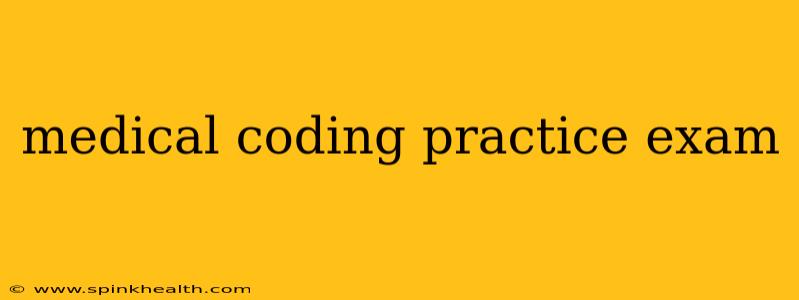The world of medical coding can feel like a labyrinth of codes, modifiers, and regulations. Preparing for your medical coding practice exam can be daunting, but with the right approach, you can navigate this maze and emerge victorious. This isn't just about memorizing codes; it's about understanding the underlying principles and applying them effectively. Let's embark on this journey together.
Imagine this: You're a medical coder, the silent architect behind the smooth flow of healthcare finances. Every coded encounter, every correctly assigned procedure code, ensures doctors get paid for their services, hospitals function efficiently, and patients receive the care they need. Your practice exam is your stepping stone to mastering this crucial role.
What is a Medical Coding Practice Exam?
A medical coding practice exam is designed to simulate the real-life experience of your certification or licensing exam. It allows you to test your knowledge, identify your strengths and weaknesses, and build your confidence before the big day. These exams typically cover a wide range of topics, including:
- ICD-10-CM Coding: Diagnoses and conditions.
- CPT Coding: Medical, surgical, and diagnostic procedures.
- HCPCS Level II Coding: Healthcare Common Procedure Coding System codes for supplies, services, and procedures not covered by CPT.
- Modifiers: Additions to codes that provide further clarification.
- Medical Terminology: Understanding the language of medicine.
- Anatomy and Physiology: Basic knowledge of the human body.
- Medical Records Review and Interpretation: Accurate extraction of relevant information.
How to Prepare for Your Medical Coding Practice Exam
Preparation is key! Consider these crucial steps:
Understanding the Exam Format:
What types of questions will be asked? Practice exams often include multiple-choice questions, fill-in-the-blank, and even scenarios requiring you to code a complete medical record. Knowing what to expect is half the battle.
Mastering the Codes:
How many codes should I know? The number varies depending on your specialty and exam, but thorough knowledge of common codes across all areas is essential. Focus on understanding why a particular code applies, not just memorizing the code itself.
Practicing with Real-World Scenarios:
Where can I find practice questions? Many online resources, textbooks, and study guides offer practice exams and sample questions. These simulated scenarios are invaluable for reinforcing your learning and applying your knowledge to realistic situations.
Identifying Your Weaknesses:
What areas do I need to focus on? After each practice exam, thoroughly review your mistakes. Identify the areas where you struggled and allocate extra time to mastering those concepts. Don't just move on—understand why you got the answer wrong.
Frequently Asked Questions (PAA)
These are some common questions students ask when preparing for medical coding practice exams:
What resources are available for medical coding practice exams?
Numerous online platforms offer practice exams, often with varying levels of difficulty and specializations. Textbooks and study guides from reputable publishers are also excellent resources, offering detailed explanations and practice questions.
How many practice exams should I take?
There's no magic number, but the more you practice, the better you'll become. Aim for a variety of exams to cover a broad range of topics and question styles. Focus on consistent practice rather than cramming.
How can I improve my medical terminology knowledge?
Flashcards, medical terminology textbooks, and online resources are helpful tools. Consistent review and practice using medical records are key to building a strong understanding.
How important is understanding anatomy and physiology for medical coding?
A solid grasp of basic anatomy and physiology is crucial for accurate coding. Understanding the relationship between body systems and procedures is essential for selecting the correct codes.
What are the best strategies for managing my time during the exam?
Practice under timed conditions. Allocate your time efficiently based on the difficulty of questions. Don't get bogged down on a single question; move on and return to it later if time allows.
Conclusion: Your Journey to Success
Passing your medical coding practice exam is a significant step towards a rewarding career. By employing diligent preparation, understanding the exam's format, and effectively utilizing practice materials, you can increase your confidence and maximize your chances of success. Remember, it's not just about memorizing codes; it's about understanding the intricate connections between medical procedures, diagnoses, and the financial mechanisms that support healthcare. Good luck on your journey!

